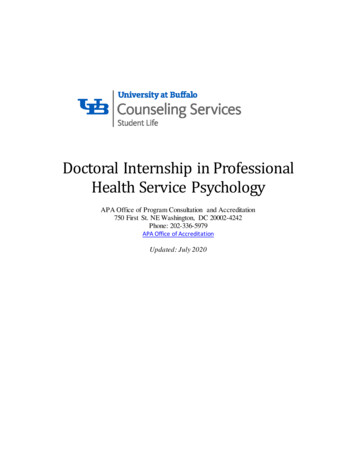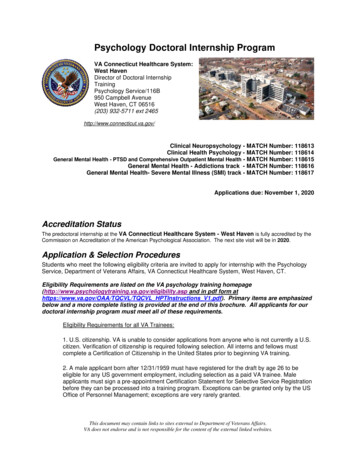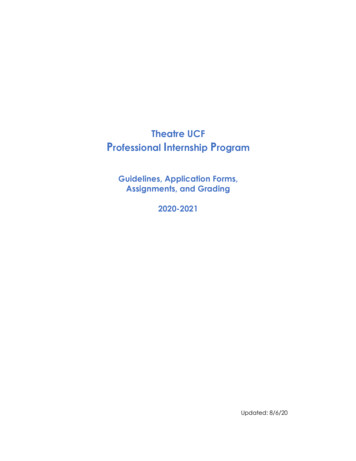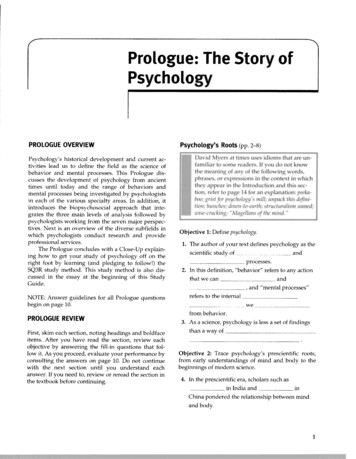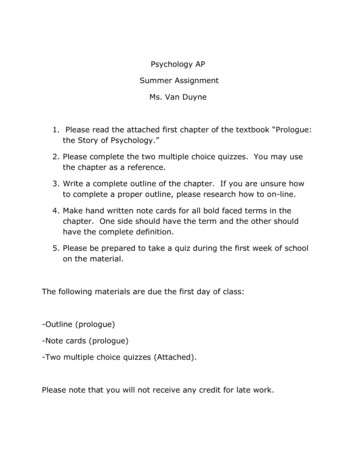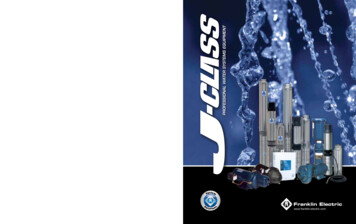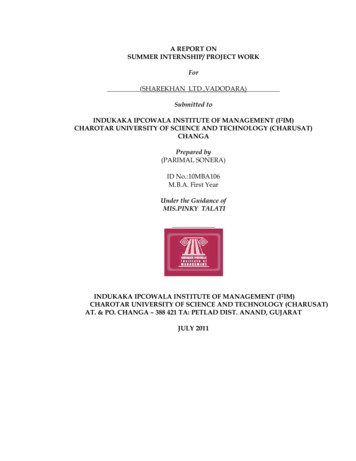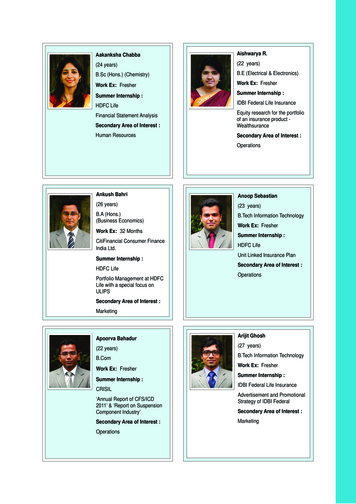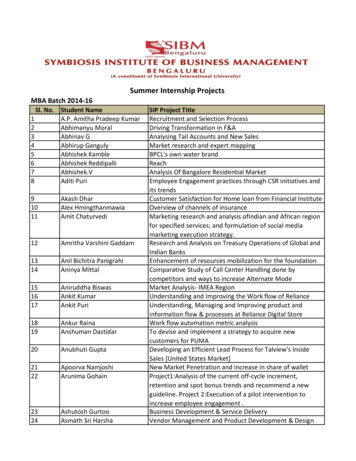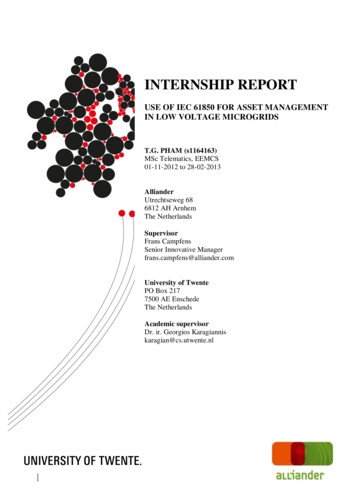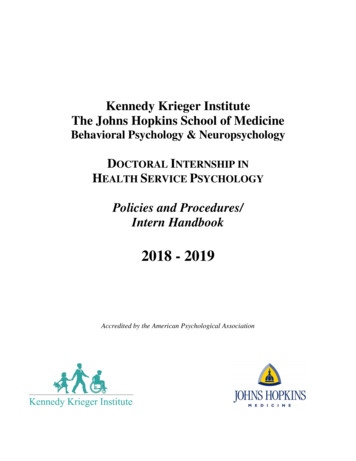
Transcription
Kennedy Krieger InstituteThe Johns Hopkins School of MedicineBehavioral Psychology & NeuropsychologyDOCTORAL INTERNSHIP INHEALTH SERVICE PSYCHOLOGYPolicies and Procedures/Intern Handbook2018 - 2019Accredited by the American Psychological Association
Revised June 27, 20182
Table of ContentsInternship OverviewFinancial AssistanceLeave PolicyProfessional DaysConference AttendanceDissertation workResearch PolicyEvaluation and FeedbackSupervisionProvision of SupervisionSupport PlanPost Doc Fellowships: Internal ApplicationsAdministrative AssistanceRemediation PlanDue ProcessIntern GrievancesPolicy for Interns who have impairmentsMaintenance of RecordsNon-Discrimination PolicyRevised June 27, 2018456789101112131415161720222426273
Internship OverviewThe Kennedy Krieger Institute/Johns Hopkins School of Medicine/BehavioralPsychology & Neuropsychology Doctoral Internship Program Aim is to prepareinterns to intermediate competence in delivery of health service psychology withchildren and adolescents with a range of behavioral, emotional, health and learningneeds and their families.The Program includes the Department of Behavioral Psychology, directed by Dr.Michael F. Cataldo and the Department of Neuropsychology, directed by Dr. E.Mark Mahone.The Training Leadership consists of:Dr. Jennifer L. Crockett (Director of Training) – crockettj@kennedykrieger.orgDr. Megan Kramer (Asst Director of Training) – kramerm@kennedykrieger.orgDr. Jonathan Schmidt (Asst Director of Training) –schmidtj@kennedykrieger.orgMs. Karen Janowiak (Training Coordinator) – janowiak@kennedykrieger.orgThe Program consists of nine training rotations across the two departments. Therotations include:Behavior Management ClinicChild and Family Therapy ClinicNeurobehavioral Outpatient UnitNeurobehavioral ContinuumNeuropsychology DeafnessNeuropsychology RehabilitationPediatric Developmental DisordersPediatric Feeding DisordersPediatric Psychology and Consultation ServicesInterns spend either six months or twelve months in their assigned rotation.Interns have individual workstations within shared offices in either the 707 N.Broadway location or the 1750 E. Fairmount location.Internship begins on July 1st and ends on June 30th. Interns receive 2,000 hours ofinternship training, with 750 of these hours devoted to direct patient contact.Revised June 27, 20184
Financial Assistance1. Doctoral Intern stipend is currently 32,894. Intern stipend level is based on NIH’s NationalResearch Service Award doctoral stipend level.2. Interns receive health insurance through the Johns Hopkins University School of Medicine’sstudent health plan. The Departments pay the premium for all Doctoral Interns. If interestedin having dependents covered, the intern is responsible for paying the difference betweenwhat KKI pays for the individual policy and the cost for two party or family coverage.3. Interns receive 15 PTO (paid time off) days and 5 professional days. Please see Leave Policyfor additional details.4. Interns receive a travel stipend for professional travel. The current stipend is 500 - 700.Please see Conference Attendance Policy for additional details.Revised June 27, 20185
Doctoral Intern Leave Policy1. Understanding that interns are expected to complete 2,000 training hours during theirinternship year, interns are granted the following leave:a) 15 PTO (paid time off) daysb) Regularly scheduled Institute holidaysc) 5 professional daysPTO days: to maximize training time across both rotations, interns should try to take PTO asequally as possible across rotations.Institute holidays: see the Kennedy Krieger Institute Holiday schedule for specific days.Professional days: refer to Professional Days policy.Bereavement Policy: In the unfortunate event that an intern needs to attend the funeral of afamily member or support a family member who is ill, the intern may use up to threebereavement days and would then use any other requested days as PTO. Extenuatingcircumstances will be discussed on a case-by-case basis.2. In the event that all professional days are exhausted, the intern will be required to use PTOdays for all remaining professional activities. If all professional and PTO days are exhaustedand additional professional time is necessary, it is up to the discretion of the supervisor as towhether or not the intern can take time off.3. As per Institute-wide policy, for illnesses/injuries, an intern may be asked to present his/hersupervisor with a physician’s letter stating the nature of the illness/injury. If the intern missesthree or more consecutive calendar days due to illness/injury, he/she may need a physician’sletter providing the date of return to work.4. Your supervisor must approve all requests for time off in advance. The intern must firstreceive approval from supervisor, complete the Intern Request for Leave form, and thenemail this form to Karen Janowiak, cc:ing the supervisor.5. Extenuating situations will be reviewed on an individual basis with the intern, supervisor andtraining directors.6. Interns wanting to request PTO during the last week of December should discuss with theirsupervisors as soon as possible. There are two Institute holidays during this final week ofDecember. For continuity of clinical care, it is difficult for some clinics/rotations to approveadditional time off during this time.7. Interns should not plan to be on PTO the first week of second rotation as this week isdedicated to rotation orientation.8. Interns are not permitted to end their training on PTO or professional leave. Interns must bephysically present on their final training day to complete the exit process.Revised June 27, 20186
Professional DaysProfessional days are vital to internship and allow interns to focus on relevant career-buildingactivities. Interns receive five (5) professional days throughout internship. It is common forinterns to need to apply PTO days for remaining professional days needed beyond the allottedfive days.The following are acceptable activities that can be used as professional days: Traveling to and attending a conference/training. Attending local training/workshop. Traveling to and attending a dissertation defense. Half-travel day permitted on either end,if needed. Traveling to and participating in a job talk/interview or post doc interview. Half-travelday permitted on either end, if needed. Traveling to graduate program for data collection in advance of defense. Half-travel daypermitted on either end, if needed. Traveling to and meeting with your advisor in advance of defense. Half-travel daypermitted on either end, if needed. Traveling to and attending graduation. Half-travel day permitted on either end, if needed. Taking the EPPP, BACB, or state exam. Limit to 1 day. Final EPPP/BACB preparation (within one week of exam). Limit to 1 day.The following are not considered appropriate for professional days and should be taken asvacation days: Job training/requirements for future employment (orientation, in-services, fingerprinting,meeting with future colleagues, etc.). General “writing dissertation” days General EPPP study time, beyond the one allotted day. Personal growth/enrichment courses/seminarsRevised June 27, 20187
Conference Attendance Policy1. Interns are granted a travel stipend to be used for one professional conference or training peryear. The amount of the travel stipend will be determined each year by the TrainingCommittee. The travel stipend is dependent upon the availability of departmental fundswithin the fiscal year. The department director will determine if sufficient funds areavailable to grant travel stipends.2. An intern will be reimbursed up to the allotted amount, with any expenses above this stipendto be paid for by the intern. In the event that the intern received a travel advance and finalexpenses totaled less than the travel advance, the intern will be required to return thedifference.3. Any amount of the stipend that is NOT used for the one conference is considered void and isunavailable for additional conferences or trainings.4. Travel stipends must be approved in advance by the supervisor. Any forms required forreimbursement, such as the Travel Expense Report and Request for Travel Advance forms,will go directly to the Supervisor. Interns should read and follow the guidelines for TravelReimbursement prior to incurring any expenses.5. Request for time off must be approved by the intern’s supervisor on which the intern isserving at the time of the conference. Requests for time off should conform to the guidelinesof the Doctoral Intern Leave Policy.Note: Currently, interns will be allotted 500 if NOT presenting at the conference and 700 ifpresenting. Interns should send proof of presentation (e.g., copy of program or acceptanceletter/email) to the Training Director with the Travel Expense Report.Revised June 27, 20188
Dissertation Policy1. Interns may work on dissertations during the work day provided that it does not interferewith assigned clinical responsibilities and the supervisor gives the approval. If there is apossibility that work on the dissertation will interfere with clinical responsibilities, the internmust work on the dissertation during non-work times (i.e., evenings and weekends).2. It is the responsibility of the intern and the supervisor to monitor the intern’s progress toensure that internship responsibilities are being successfully completed.3. Interns who would like to conduct their dissertation as a part of their internship shoulddiscuss their proposal with their supervisor. If the supervisor and intern agree on apreliminary plan, the intern should write an abstract describing the project. This abstract willbe submitted to the training committee for review. The training committee may providefeedback to the intern and supervisor when appropriate. Keep in mind that if data arecollected at KKI, the study will be subject to review by the Institutional Review Board (IRB)of the Johns Hopkins University School of Medicine in addition to the IRB of the intern’suniversity. Interns should discuss this with their supervisors. The intern and supervisor will schedule a time for the intern to present proposal. Themeeting can be one of the regularly scheduled rounds, topical seminars, etc. The facultywill be invited to attend this meeting. The faculty may provide feedback to the intern. Based on the feedback from the faculty, the supervisor and intern can decide to modifythe plan or proceed as proposed. The supervisor will monitor the project and provide monthly updates to the trainingcommittee.4. In the event the intern needs time off for dissertation defenses and other related meetingsaway from work (e.g., the intern must return to his/her university), the intern must requesttime off before the scheduled event and use the allotted professional time. See the internleave policy for additional details.Revised June 27, 20189
Research Policy1. Research is considered a Profession Wide Competency (PWC), therefore research is anexpected component of internship.2. At a minimum, interns will meet this expectation through collecting, analyzing andpresenting data at a clinic-, departmental-, or institute-level event.3. Others will do the same at a local, regional, national or international professional event (e.g.,conference).4. Beyond the research requirements of internship, some may be interested in working withfaculty on developing new research questions. The following guidelines apply:a. It is generally recommended that you not commit to a research project until after thefirst quarter of internship (i.e., beginning of October). This will allow you time tobecome accustomed to the duties of your clinical rotation and your new schedule.However, if you have discussed your participation in the project with your immediatesupervisor and he/she approves, you can start sooner.b. After you have identified a research project, contact the investigator to obtain details(e.g., how many hours per week, what day(s), and responsibilities). Do NOT make acommitment to participate in the project.c. Meet with your clinical supervisor to discuss this research opportunity. If you andyour supervisor agree that this will not take away from your clinical activities, youcan make the necessary arrangements with the investigator.5. Your dissertation does NOT qualify for this research option. Please see the trainingprogram's dissertation policy.Revised June 27, 201810
Evaluation and FeedbackIntern Evaluation1. Interns receive written evaluations on a quarterly basis. Evaluations are discussed in personbetween the intern and supervisor(s).2. Evaluations are based on progress towards the nine Profession Wide Competencies and thebehavioral elements within each.3. Supervisors conduct at least two direct observations (live or video) of the intern engaging inclinical service within each quarter and combine these with supervisor impressions fromdiscussions during supervision to determine evaluation ratings.4. Supervisors may also use direct observations in case presentations and group meetings, directobservation in simulated scenarios, and permanent products (notes, graphs, presentations) indetermining ratings.5. The following rating scale is used for quarterly evaluations:1: Performance is at pre-internship or practicum level.2: Performance is at level expected for entry to internship3: Performance is at level expected for midpoint of internship4: Performance is at level expected for completion of internship/entry to practice5: Performance is at level expected for advanced practice.6. Each intern is expected to achieve a First and Second Quarter rating of at least a “2,” a ThirdQuarter rating of at least a “3,” and a Fourth Quarter rating of at least a “4.” Minimum levelof achievement necessary for successful completion of internship is a “4” on each behavioralelement for each profession wide competency at the Fourth Quarter rating, understandingthat most continue on for specialized training in a fellowship.7. If an intern receives a rating lower than those specified above, a written support plan isdeveloped to bring the intern to minimal levels of performance.8. Evaluations are sent to the intern’s Clinical Director of Training at the end of Second Quarterand Fourth Quarter.Feedback from Interns1. Interns evaluate supervisors on a quarterly basis. These evaluations are NOT distributed tosupervisors until after the internship year. The supervisors receive aggregated andanonymized feedback at the completion of the internship year. However, if the trainingdirectors feel that an issue must be handled immediately, the training directors will contactthe intern to discuss a plan.2. Interns evaluate their current rotation at the end of December and at the end of June.3. Interns also evaluate the degree to which the training program is meeting the goals andpreparing the interns for the stated competencies. This occurs at the end of December and theend of June.Revised June 27, 201811
Supervision1. Interns receive a minimum of 2 hours individual supervision and 2 hours of groupsupervision per week. Interns are responsible for tracking their supervision hours each week.The Training Coordinator monitors the logs on a monthly basis and sends reports to theTraining Directors and Supervisors.2. Supervisors must be licensed psychologists in the state of Maryland and credentialedpsychologists through the KKI Medical Staff Office.3. Supervision focuses on the application of psychological concepts and current scientificknowledge, principles, and theories to the professional delivery of psychological services.Supervision also provides an opportunity for discussion of individual and culturalconsiderations, professional conduct, professional development and ethics and standards forproviders of psychological services.4. Individual supervision time is protected each week. That is, it is scheduled in advance so thatboth intern and supervisor can depend on that time for supervision. Interns should understandthat supervision will occasionally get interrupted or will need to be rescheduled. Supervisorsshould minimize interruptions as much as possible and should make up any missedsupervision as soon as possible.5. Group supervision may consist of peer review, case conferences, research meetings orjournal clubs. Supervisors will review with each intern the specific activities that qualify asgroup supervision, considering that the content should be specific to building capacitydirectly related to the intern’s position and that supervision should be case-specific, withfeedback directed at the intern for growth and development. Events such as grand rounds anddidactic presentations are considered knowledge-based training opportunities and do notqualify as supervision.6. Supervision also occurs throughout each week via electronic feedback on case-relatedproducts (e.g., evaluation, progress notes, case summaries, case-related data, etc.).7. Supervisor availability outside of regularly scheduled supervision occurs through an “opendoor” policy so that interns can meet with supervisors on an as needed basis as situationsarise. Each rotation also has a Supervisor on the premises at all times interns are engaging inclinical service.Revised June 27, 201812
Provision of Supervision PolicyDefinition: Applies knowledge of supervision models and practices with supervisee.Some clinics will have the option to have interns provide supervised supervision to externs,clinical specialists, or behavior data specialists. Other clinics will have interns providesupervised supervision to interns.Program-Wide Requirements:1. Initial didactic in “Becoming a Supervisor” during 1st Quarter2. Follow-up didactic/group exercises during 2nd Quarter and 3rd Quarter3. Ethics of Supervision, Supervision Wrap Up during 4th QuarterRequirements:1. Each intern should have a minimum of .5 hours per month of internship supervisiondevoted specifically to their provision of supervision to others.2. A supervisor must be present and provide feedback to the intern after the session.3. The supervision can be based on a case discussion or an observed session (either live orrecorded).Revised June 27, 201813
Support PlanThe department understands that additional support, beyond what is programmatically providedthrough the internship, may be necessary if an intern’s performance drops below that expected ofthe intern. To ensure all interns have sufficient support to develop skills necessary for entry topractice, the following Support Plan policy is to be followed and is based on the guidelines setforth by the Kennedy Krieger Institute, The Johns Hopkins University School of Medicine, APA,and APPIC.If a supervisor determines that an intern’s performance on a particular behavioral element is notat expected level and performance has not improved following verbal feedback, or if an internreceives below a “2” at First or Second Quarter evaluation or below a “3” at Third Quarterevaluation, the following procedures will be initiated:a) Written support plan to be implemented including:i. an operational definition of the intern’s behavior that needs improvement.ii. actions needed by the supervisor to support the intern in correcting deficit.iii. the time line for reviewing progress (suggested, two to four weeks).iv. action that will be taken if performance does not improve.v. notification that the intern has the right to request a review of this action.vi. The supervisor, intern, and training director sign the written plan.vii. The Director of Clinical Training will be notified if a support plan is implemented.b) If performance has improved, the supervisor and intern agree to continue with the supportplan and agree to monitor performance in specified (suggested, two to four week)intervals until satisfied that performance has returned to expected levels. Performance isthen tr
The Kennedy Krieger Institute/Johns Hopkins School of Medicine/Behavioral Psychology & Neuropsychology Doctoral Internship Program Aim is to prepare interns to intermediate competence in delivery of health service psychology with children and adolescents with a range of behavioral, emotional, health and learning needs and their families.
